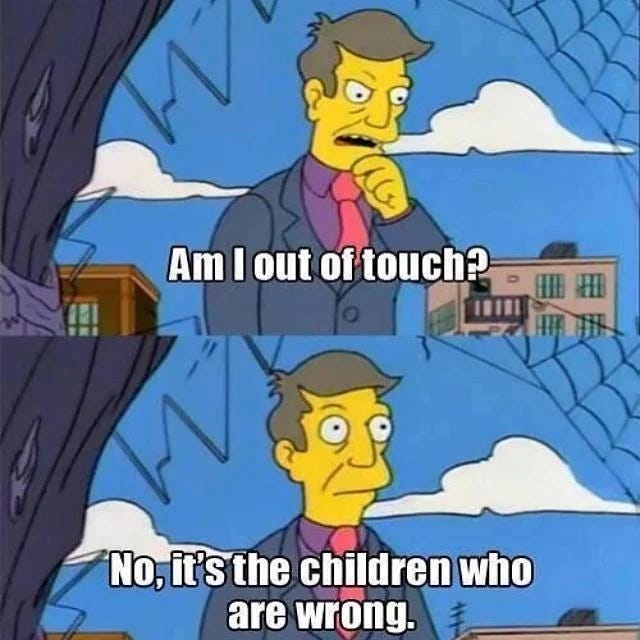In Maoist Self-Criticism Session, New York Times Editors Decide They're Doing Great!
Well that's a relief.
Oh boy! Time for an inside scoop on the New York Times, whose newsroom staff and editors held a closed-door, off-the-record meeting October 24 to discuss its election coverage. As sometimes happens with a Grey Lady of a certain age, something leaked — in this case, a recording that made its way to Semafor reporter Max Tani. He published the deets Monday, revealing that one of the top themes of reporters’ questions for the bosses was, Tani says, “Had the paper’s leadership noticed how many Democrats had become furious at it over its coverage of Donald Trump?”
During the meeting, Times Executive Editor Joe Kahn and Managing Editor Carolyn Ryan took questions from the staff, who wanted to know “whether the paper’s coverage of Trump adequately reflected his authoritarian impulses, and whether the paper had deliberately grown more aggressive in the final weeks of the campaign.” And of course, several wanted to know what was the deal with the weeks of obsessive coverage of Joe Biden’s age, but only a very recent focus on Trump’s tiny wandering brain?
Moderator Astead Herndon summarized questions from several reporters, saying,
“We got a lot of questions from folks worrying about what is in effect the ‘sanewashing’ of him, a term that has come up in terms of criticism of our coverage. […]
“One colleague wrote in: ‘Can you talk about the decision to cover Trump’s age so aggressively in the last few weeks but not before that? Should we take that as a reaction to some of the external criticism? Why has there been a shift?’ Because it does seem like there’s been a more direct tone against Trump in the last couple months? Is that intentional?”
You may be shocked to learn that Khan thought the Times has been doing a terrific job and that he believed outside critics are just pushing their own agendas and trying to make the Times do their bidding. And worse, those critics simply aren’t very well-informed about what a great job the Times has been doing.
“What they’re interested in is having us be a mouthpiece for their already predetermined point of view. That’s what the most vocal critics are asking for. They’re asking us to do a better job projecting their point of view to more people. That of course is not our role, that is actually the opposite of independent journalism. That’s agenda-driven partisan journalism. They want to see The New York Times reaffirming their own priors.”
Kahn also wasn’t terribly open to the idea that the criticism might be useful, because again, it’s all so partisan and not objective. Co-moderator Jodi Kantor asked him if he’d noticed in all the recent criticism from the Left that maybe the critics had a point, and did that account for the slightly more critical focus on Trump?
“No, honestly, just no,” Kahn said. “I get all that incoming very powerfully in my inbox and in many conversations that I have. And I understand that that’s been a criticism of us,” he said. He noted particular criticism over the way the paper had focused on President Joe Biden’s age and had failed to promote similarly skeptical coverage of Trump, at least until the last minute.
“The truth is every once in a while there are good-spirited critics on both sides who genuinely want to see the Times lift its game. Most of what you’re describing is not that. Our focus is on doing the right thing journalistically at every step.”
There’s good-spirited criticism from the Right? Maybe that’s from the people who simply want to see reporters deported instead of executed on live TV.
In any case, Kahn denied having been influenced by outside critiques, saying that instead the closer focus on Trump was simply a natural function of the election getting closer, and something something “our home screen experience.”
Ryan added that the paper isn’t now focusing on Trump’s sundowning to compensate for its obsessive Biden coverage (oh, there we go being Online Left and missing the big picture), but because the “dynamics” of the election have changed with only one old man in the race, which cleverly elides the question of why the Times was only focused on the other old man when there were two of ‘em.
“We did cover Trump’s age and behavior in relation to Biden, and he was the beneficiary in some ways of that natural comparison to Biden,” Ryan said of Trump. “But I do think we have very sharply told people what we are observing over time, and we have said it admirably and directly, and that’s part of the reason these stories are landing.”
Also there was a whole lot of excuse-making from Kahn about the online Left only being a tiny part of Times readership, and besides, almost nobody actually posts comments on stories, proving that everyone else among the paper’s 10 million subscribers — a record — must be happy with the Times as it is:
“We have a 1% participation rate of people who actually make comments. One in 100 people make them, as opposed to look at them. What is the percentage of people who ever look at comments versus the percentage of people who consume New York Times journalism? That is also a very small percentage. Those vocal critics are a very small percentage of a very small percentage.”
The New York Times, like Wonkette, frequently does not allow comments. But besides that, we’re sure he’s got a perfectly cromulent point: Since the New York Times fired its ombudsman and said the readers would be the ombudsman, if only a tiny percentage are commenting in outrage on their stories, when they allow them, then … ??? PROFIT!
Besides, the critics are all locked away in their own media bubbles, so they can’t even appreciate all our hard work, especially since they only drop in to criticize particular articles instead of the full range of the Times’s coverage.
No, that doesn’t at all sound like Jordan Peterson fans insisting you can’t criticize some batshit thing he says unless you’ve first watched at least 100 hour of his videos.
Kahn also briefly discussed how the paper may be affected by a Trump win. It would have to be ready to find ways to keep doing journalism after Trump starts down his promised path of revenge. And it would have to prepare to “cover the potential radical reshaping of the government,” like weaponizing the Justice Department against Trump’s enemies, or Trump’s plan to “have mass emigration,” because apparently Kahn though that was more objective than mass deportation.
Or perhaps he couldn’t bring the word “deportation” to mind, indicating that Joe Kahn can’t be president now the end.
[Semafor]
Yr Wonkette is funded entirely by reader donations. If you can, please become a paid subscriber, or if you’d like to make a one-time donation to our not terribly objective but always fair and accurate mommyblog, here is your button!





Times Staff Writer: "How do you respond to the criticisms of the NY Times' work this election cycle?"
Joe Kahn: "Well it's the internet, and so countless criticisms comprise profoundly partisan profanity."
TSW: "Okay, but how do you respond to the VALID criticisms."
Kahn: "Credible criticisms are a manifestly minimal minority."
TSW: "Right, because it's the internet. And also not everyone will be expert on a thing -- by definition since expertise requires knowing what most people don't know about a subject. Still, worthwhile, informed and intelligent criticisms exist. Have they changed our coverage?"
Kahn: "Knowledgeable or not, juvenile journalistic jockeying for reader raves and commenter compliments is ultimately unprofessional."
TSW: "I'm sorry, but we're a professional media outlet. If we believe that people should pay to read us because being exposed to new information and different perspectives is important for self-betterment -- not to mention self-government -- isn't it hypocritical of us to refuse to inform ourselves and instead focus on needless clickbait bullshit like unnecessary alliteration?"
Kahn: "Not necessarily, no."
"We decided to focus on the age and mental acuity of one candidate in particular when both candidates were old men, but now we aren't because only one is and we can't properly do both sides journalism when the criticisms only apply to one side. And really, why should we spend too much time on the issue when it's now magically no longer a concern worthy of journalistic exploration." I guess?